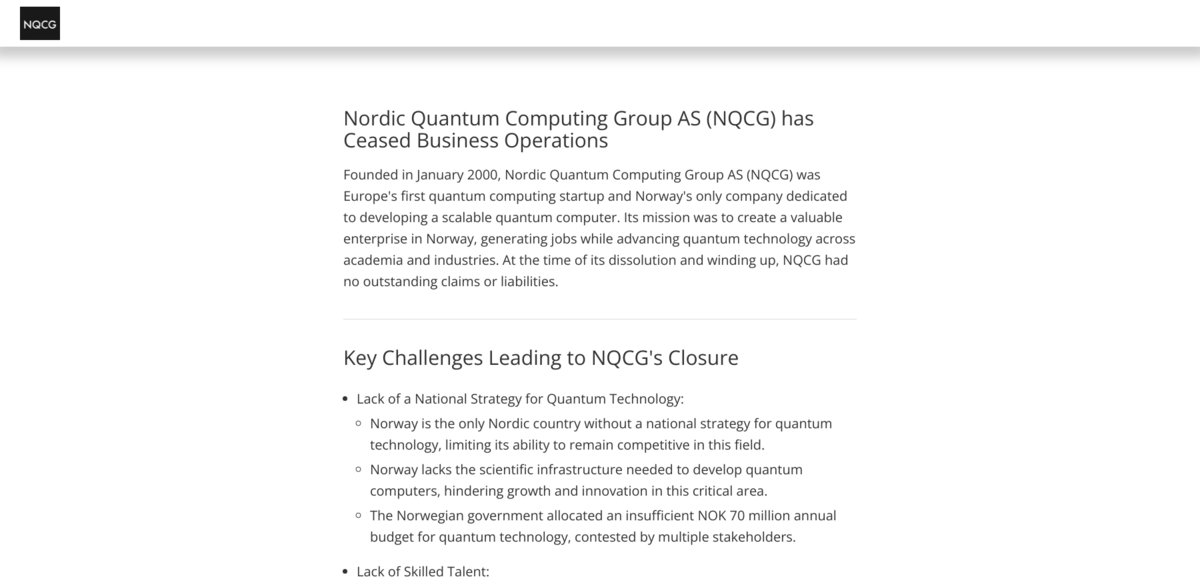What is Nordic Quantum Computing Group AS (NQCG)?
Founded back in January 2000, Nordic Quantum Computing Group AS, or NQCG, was Europe’s very first quantum computing startup and Norway’s only company fully dedicated to developing a scalable quantum computer. Their mission? To build a valuable enterprise right in Norway, creating jobs while pushing the boundaries of quantum technology across both academia and industry. NQCG aimed to build the world’s fastest and most powerful optical quantum computers, making them universally accessible and useful for research, business, and society at large. The company focused on fully programmable and scalable optical quantum computers, offering access through the cloud to accelerate industry transformation and build a profitable, planet-friendly business.
Main Benefits and Key Facts About NQCG
Here’s a quick snapshot of what made NQCG stand out:
- Founded in 2000, pioneering quantum computing in Europe and Norway.
- Focused on optical quantum computers with cloud accessibility.
- Targeted financial industry challenges like portfolio optimization, derivatives pricing, and quantitative trading strategies.
- R&D centered on photonics chip design, quantum algorithm development for finance, and quantum machine learning using photonic platforms.
- Strong Nordic presence with ties to leading universities and national research labs.
- Team expertise spans quantum computing research, photonics design, machine learning, quantitative investment, trading, and intellectual property rights.
- Ceased operations on December 6, 2024, after 25 years of innovation.
Challenges Leading to NQCG’s Closure
Despite its pioneering role, NQCG faced some pretty tough hurdles that ultimately led to its closure. The lack of a national strategy for quantum technology in Norway was a major roadblock. Norway stands out as the only Nordic country without such a strategy, which seriously limited its competitiveness in this cutting-edge field. The country also lacks the scientific infrastructure needed to develop quantum computers, making growth and innovation a real uphill battle. Plus, the government’s annual budget for quantum tech was a mere NOK 70 million — a figure many stakeholders found way too low.
The Talent and Tax Troubles
Recruiting skilled talent was another big challenge. Norway doesn’t have a “Startup Visa,” which means international talent faces delays, pushing startups to look elsewhere for better conditions. On top of that, an exit tax means employees returning to their home countries get hit with a hefty 37.84% tax burden. This “skills tax” makes it crazy expensive for tech startups that rely heavily on imported expertise to operate in Norway. Then there’s the owner tax — which has shot up by 107% since 2021 — driving entrepreneurs and investors away. Norway’s wealth tax on unrealised capital gains is especially tough, taxing assets that grow in value without generating cash flow. It’s one of the few countries with such a tax, and it really discourages founders from building globally competitive businesses.
The Impact of the Exit Tax
Adding fuel to the fire, Norway introduced a retroactive exit tax effective March 20, 2024, and enforceable from January 1, 2025. This tax hits tech startups hard, especially those needing large VC investments — often $100 million or more — and long timelines before seeing returns. It’s a real catch-22: scaling up usually means relocating abroad, but doing so triggers the exit tax, effectively discouraging founders from expanding globally. This policy environment made it nearly impossible for NQCG to continue its operations despite its groundbreaking work.
The Legacy and Impact of NQCG
- SDG 9: Industry, Innovation, and Infrastructure — advancing quantum technology and innovation.
- SDG 8: Decent Work and Economic Growth — creating jobs and fostering enterprise in Norway.
- SDG 4: Quality Education — collaborating with universities and research labs to push academic boundaries.
- SDG 13: Climate Action — aiming to build a profitable business that safeguards the planet for future generations.
- SDG 17: Partnerships for the Goals — strong Nordic presence and collaboration with industry experts.
Looking Back and Forward
Though NQCG has formally ceased operations, its journey highlights the critical role government policies play in nurturing or hindering emerging tech sectors like quantum computing. The company’s closure on December 6, 2024, after 25 years of pushing the frontier, serves as a wake-up call. Stable, forward-thinking policies are essential to support growth in groundbreaking fields. For Norway, the story of NQCG underscores the urgent need for a national quantum strategy, better talent immigration policies, and a tax environment that encourages innovation rather than stifles it. Meanwhile, archived versions of NQCG’s webpages remain accessible for those curious about their pioneering work: https://archive.1.nqcg.com/ and https://archive.2.nqcg.com/.


















